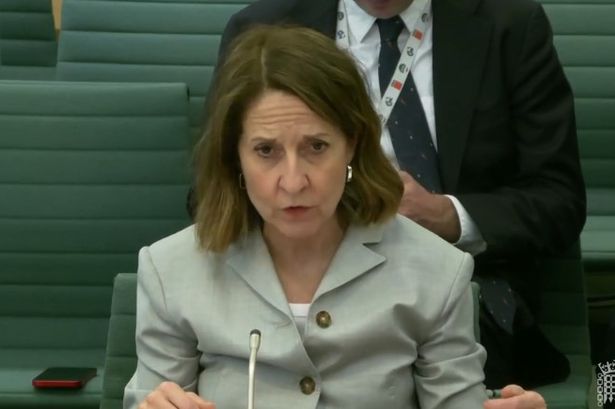Politics
Liz Kendall Defends Welfare Reforms Amid Criticism Over Cuts

Work and Pensions Secretary Liz Kendall faced significant pushback during a recent session of the Work and Pensions Committee, where she defended proposed welfare reforms amid accusations of neglecting the needs of disabled individuals. The debate intensified over plans to cut £5 billion from the welfare budget, a move that has raised concerns among various lawmakers and advocacy groups.
During the hearing, Liberal Democrat MP Steve Darling, who is registered blind, challenged Ms. Kendall regarding the lack of consultation with disabled citizens before announcing cuts to the Personal Independence Payments (PIP). These payments represent the primary financial support for those with disabilities. Mr. Darling pointed out that the proposed changes were shelved until a review could be conducted by DWP Minister Sir Stephen Timms in 2024, highlighting the government’s failure to adhere to its promise of not leading reforms through cuts.
Ms. Kendall acknowledged the process has been tumultuous but maintained that the adjustments are necessary. “This has been a bumpy ride,” she stated, asserting that the reforms are now “in the right place.” She emphasized that her department’s focus is on what can help individuals with long-term health conditions build better lives, rather than merely cutting costs.
Mr. Darling pressed for clarity on why the voices of disabled people were seemingly overlooked, asking, “Why did you ignore disabled people?” In response, Ms. Kendall insisted that the government is committed to putting disabled individuals at the forefront of the upcoming review. “We are not ignoring disabled people,” she affirmed.
Government Spending and Child Poverty Strategy
Throughout the discussion, Ms. Kendall argued that the government must address the underlying issues of poverty and unemployment that lead to welfare dependency. “We are spending too much on the costs of failure and not enough on better health, better jobs, and better skills,” she noted, acknowledging the challenges of shifting resources in a system where many individuals rely heavily on benefits.
The Work and Pensions Secretary also faced scrutiny over the delayed child poverty strategy, which is now expected to be published in the autumn. Ms. Kendall rejected claims of slippage in the government’s efforts to assist the approximately 4.5 million children living in poverty in the UK. She highlighted initiatives like the expansion of free school meals for children in households receiving Universal Credit and free breakfast clubs as critical steps toward addressing child poverty.
When pressed about the lack of publication for the child poverty strategy, Ms. Kendall responded, “We want to get this right,” emphasizing the importance of a comprehensive plan that considers funding implications. She expressed pride in the initial steps taken but acknowledged there is much work to be done.
As the debate over welfare reform continues, the government faces increasing pressure to balance fiscal responsibility with the needs of vulnerable populations. The forthcoming review led by Sir Stephen Timms may play a crucial role in shaping future policies, particularly as advocates for disabled individuals and families in poverty await assurances that their voices will be heard in the decision-making process.
-

 Entertainment3 months ago
Entertainment3 months agoAnn Ming Reflects on ITV’s ‘I Fought the Law’ Drama
-

 Entertainment4 months ago
Entertainment4 months agoKate Garraway Sells £2 Million Home Amid Financial Struggles
-

 Health3 months ago
Health3 months agoKatie Price Faces New Health Concerns After Cancer Symptoms Resurface
-

 Entertainment3 months ago
Entertainment3 months agoCoronation Street’s Carl Webster Faces Trouble with New Affairs
-

 Entertainment3 months ago
Entertainment3 months agoWhere is Tinder Swindler Simon Leviev? Latest Updates Revealed
-

 Entertainment4 months ago
Entertainment4 months agoMarkiplier Addresses AI Controversy During Livestream Response
-

 Science1 month ago
Science1 month agoBrian Cox Addresses Claims of Alien Probe in 3I/ATLAS Discovery
-

 Entertainment4 months ago
Entertainment4 months agoKim Cattrall Posts Cryptic Message After HBO’s Sequel Cancellation
-

 Entertainment3 months ago
Entertainment3 months agoOlivia Attwood Opens Up About Fallout with Former Best Friend
-

 Entertainment6 days ago
Entertainment6 days agoCoronation Street Fans React as Todd Faces Heartbreaking Choice
-

 Entertainment3 months ago
Entertainment3 months agoMasterChef Faces Turmoil as Tom Kerridge Withdraws from Hosting Role
-

 Entertainment4 months ago
Entertainment4 months agoSpeculation Surrounds Home and Away as Cast Departures Mount















